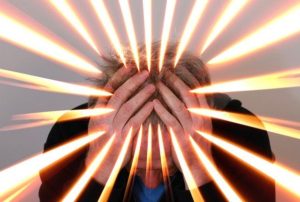How many times have you suddenly, for no particular reason, felt anxiety, unexplained fear, internal restlessness, tightness in your chest?
Although many think that the onset of this condition, also known as anxiety, is solely caused by environmental factors, the real culprit is hiding in us, more precisely in our heads. Any feeling, whether positive or negative, is the result of our thinking, experts say, and the first step in solving the problem is finding and naming an emotion that has completely unconsciously caused anxiety. Although this task may not seem difficult at first glance, it actually requires a lot of time, patience and a good knowledge of yourself.
 Stress is a natural response to some demanding life situation that tells us body and mind that we are not fully prepared for the challenge we are facing. Very often, in this case, we do our best. However, when stress occurs for no particular reason, if it occurs to a greater extent than the situation in which we cause it, or is completely irrational, it may not be more about stress, but anxiety. In any case, when treated appropriately, stress and anxiety can be controlled, or at least not so uncomfortable.
Stress is a natural response to some demanding life situation that tells us body and mind that we are not fully prepared for the challenge we are facing. Very often, in this case, we do our best. However, when stress occurs for no particular reason, if it occurs to a greater extent than the situation in which we cause it, or is completely irrational, it may not be more about stress, but anxiety. In any case, when treated appropriately, stress and anxiety can be controlled, or at least not so uncomfortable.
Stress
Our stress response is also conditioned by our sensitivity threshold.
When life circumstances are such as to bring stress, anxiety and even excitement associated with positive events, the so-called fight or flight mechanism is activated.
If life is filled with constant stress, the sympathetic nervous system which is responsible for stress signs can also become constantly active, creating an internal tension that no longer has to be matched by realistic circumstances.
This condition usually lead to anxiety and chronic stress.
How long does it take to detect an emotion which causes anxiety and chronic stress?
As long as it takes to create an irrational belief that causes anxiety. It is a process that takes time and patience.
If the nervous system stimulation and stress response become a constant occurrence, our energy reservoirs will drain over time, which can lead the body to a state of fatigue and exhaustion – burn out. As a result, fatigue and exhaustion become a cause for additional worry, triggering a re-stress response, thus forming a vicious cycle.
The only permanent solution is to find a way out of this vicious circle.
How to stop chronic stress, anxiety, and the accompanying signs?
If anxiety and stress are not due to a disease, the process of overcoming it can be divided into 4 steps
1. Recognition
So, first of all, concern and tension should be noted as something that is harmful.
The mindfulness program of conscious attention also brings a deeper understanding of the mechanisms of the mind, through paying attention to the fine signals sent by the body and mind.
2. Understanding
It is important to understand that worrying is a process that is useless and does not solve the problem. When worrying about something, ask yourself what you achieve with that? Instead of worrying about a problem, take concrete steps to solve it, sometimes you cannot solve the problem immediately, and sometimes it is not under your control and needs to be accepted and allowed to pass for a while.
3. Change
This implies that we have a desire to change and to get to know ourselves better and to accept that the whole process will take perhaps longer than expected, but that we are ready for it.
4. Strengthening stability
Perhaps the new life skill that we all need to master is precisely the skill of adapting to new, accelerated, competitive, changing living conditions.
When we learn how to break the vicious cycle of nervousness and tension, we may find that the quality of life experience we have has also changed.
We may notice that we do not need perfect life circumstances to be happy, but that we need a stable mind to be happy and fulfilled, regardless of the challenges we face even if we can’t eliminate stress altogether from our lives.





